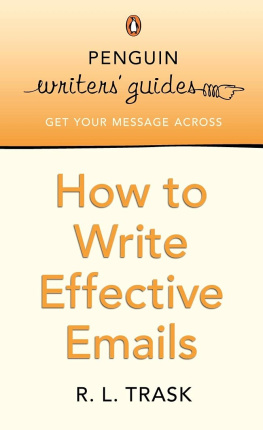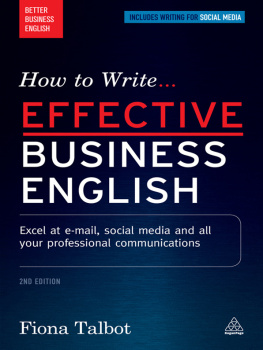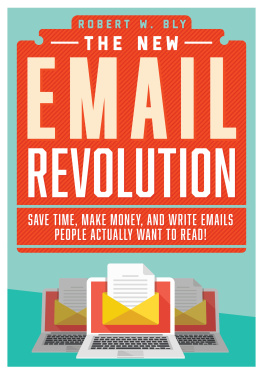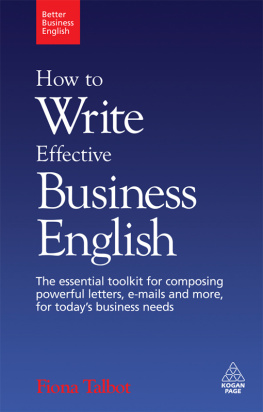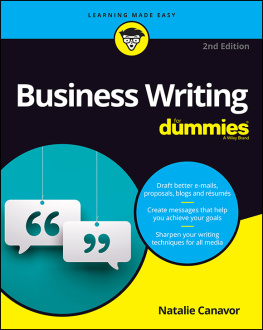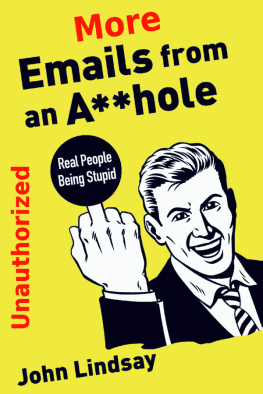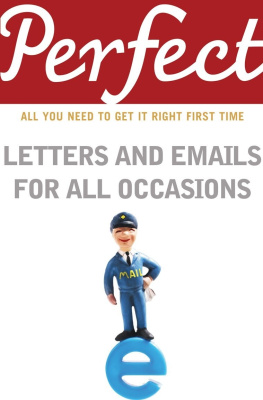R. L. Trask - Penguin Writers Guides: How to Write Effective Emails: How to Write Effective Emails
Here you can read online R. L. Trask - Penguin Writers Guides: How to Write Effective Emails: How to Write Effective Emails full text of the book (entire story) in english for free. Download pdf and epub, get meaning, cover and reviews about this ebook. year: 2005, publisher: Penguin UK, genre: Religion. Description of the work, (preface) as well as reviews are available. Best literature library LitArk.com created for fans of good reading and offers a wide selection of genres:
Romance novel
Science fiction
Adventure
Detective
Science
History
Home and family
Prose
Art
Politics
Computer
Non-fiction
Religion
Business
Children
Humor
Choose a favorite category and find really read worthwhile books. Enjoy immersion in the world of imagination, feel the emotions of the characters or learn something new for yourself, make an fascinating discovery.
Penguin Writers Guides: How to Write Effective Emails: How to Write Effective Emails: summary, description and annotation
We offer to read an annotation, description, summary or preface (depends on what the author of the book "Penguin Writers Guides: How to Write Effective Emails: How to Write Effective Emails" wrote himself). If you haven't found the necessary information about the book — write in the comments, we will try to find it.
R. L. Trask: author's other books
Who wrote Penguin Writers Guides: How to Write Effective Emails: How to Write Effective Emails? Find out the surname, the name of the author of the book and a list of all author's works by series.
Penguin Writers Guides: How to Write Effective Emails: How to Write Effective Emails — read online for free the complete book (whole text) full work
Below is the text of the book, divided by pages. System saving the place of the last page read, allows you to conveniently read the book "Penguin Writers Guides: How to Write Effective Emails: How to Write Effective Emails" online for free, without having to search again every time where you left off. Put a bookmark, and you can go to the page where you finished reading at any time.
Font size:
Interval:
Bookmark:
PENGUIN WRITERS GUIDES
How to Write Effective Emails
R. L. Trask was born in western New York State in 1944. Having come to England in 1970, he obtained his Ph.D. from the University of London in 1983. He taught linguistics at the University of Liverpool from 1979 to 1988, and then at the School of Cognitive and Computing Science (now the Linguistics and English Language Department) at the University of Sussex. His special interests were historical linguistics, grammar and the Basque language. He wrote a number of books, including A Dictionary of Grammatical Terms in Linguistics, Language Change, Language: The Basics, The Penguin Guide to Punctuation, The Penguin Dictionary of English Grammar and Mind the Gaffe. How to Write Effective Emails is sadly his last book for Penguin as he died in 2004.
The Penguin Writers Guides
How to Punctuate George Davidson
How to Write Better English Robert Allen
How to Write Effective Emails R. L. Trask
Improve Your Spelling George Davidson
Writing for Business Chris Shevlin
PENGUIN WRITERS GUIDES
R. L. TRASK

PENGUIN BOOKS
PENGUIN BOOKS
Published by the Penguin Group
Penguin Books Ltd, 80 Strand, London WC2R 0RL , England
Penguin Group (USA) Inc., 375 Hudson Street, New York, New York 10014, USA
Penguin Group (Canada), 10 Alcorn Avenue, Toronto, Ontario, Canada M4V 3B2
(a division of Pearson Penguin Canada Inc.)
Penguin Ireland, 25 St Stephens Green, Dublin 2, Ireland
(a division of Penguin Books Ltd)
Penguin Group (Australia), 250 Camberwell Road,
Camberwell, Victoria 3124, Australia (a division of Pearson Australia Group Pty Ltd)
Penguin Books India Pvt Ltd, 11 Community Centre,
Panchsheel Park, New Delhi 110 017, India
Penguin Group (NZ), cnr Airborne and Rosedale Roads, Albany,
Auckland 1310, New Zealand (a division of Pearson New Zealand Ltd)
Penguin Books (South Africa) (Pty) Ltd, 24 Sturdee Avenue,
Rosebank 2196, South Africa
Penguin Books Ltd, Registered Offices: 80 Strand, London WC2R 0RL , England
www.penguin.com
First published 2005
2
Copyright R. L. Trask, 2005
All rights reserved
The moral right of the author has been asserted
Except in the United States of America, this book is sold subject to the condition that it shall not, by way of trade or otherwise, be lent, re-sold, hired out, or otherwise circulated without the publishers prior consent in any form of binding or cover other than that in which it is published and without a similar condition including this condition being imposed on the subsequent purchaser
ISBN: 978-0-14-193669-7
For my wonderful Jan
For advice on various points, I am indebted to Marion Brooker, Nick Brooker, Richard Coates, Emily Ellerton, Jan Lock, Lynne Murphy, Geoffrey Sampson, Patrick Warren and Max Wheeler.
While writing this book, I consulted dozens of web pages offering advice on email. The ones which I found particularly helpful were those constructed by Jim Britell ( http://www.britell.com/use/use19.html ), Sally Hambridge ( http://www.dtcc.edu/cs/rfc1855.html ) and Kaitlin Duck Sherwood ( http://www.webfoot.com/advice/emailtop.html ). All were consulted in January 2003.
Any shortcomings are my own responsibility.
What This Book Is For
More and more of us are spending more and more time sending and receiving emails. If youre looking at this book, then you are probably already deep into the world of electronic mail. Some of your emails are probably informal chit-chat with close friends or with fellow hobbyists, but others are different. Sometimes you send an email to somebody you dont know at all, looking for advice or assistance. And sometimes you send emails to business colleagues, with the intention of getting some work done. And thats what this book is for.
When you mail a friend or a fellow enthusiast, you can use your own judgement as to what style is best, and you may choose a casual and chatty style, perhaps even a jokey one. But, when you approach a stranger or a business associate, things are utterly different. Now, a casual and chatty style is dead wrong, and a very different style is called for.
The purpose of this book is to help you to write effective emails when you deal with strangers and business colleagues. When you are looking for advice or assistance, or when you are conducting any kind of serious business electronically, you want to make the best possible impression on the people you are mailing. You want them to see that you are mature, businesslike and professional, and you want them to conclude that your mail should be taken seriously. You do not want to give them the impression that you are dopey, irresponsible or immature, that you are merely a child fooling around with a new toy.
Writing effective emails is not a trivial task. Just like learning anything worthwhile, learning to write good emails takes time, attention and effort. You need to pay attention to what you are doing, to think about whether you are doing the right thing, and to put a good deal of effort into what you write.
Email has been around long enough now that a body of conventions has grown up concerning what is courteous and proper. These conventions are commonly known as Netiquette, a cute neologism for etiquette on the Internet. If you want your emails to be taken seriously, then it is vital that you respect the conventions of Netiquette. And teaching you those conventions is the purpose of this book.
Judging by the large number of truly awful emails I receive every week, I conclude that there are a lot of people out there who have not yet understood the importance of learning to write emails properly. Astonishingly, there are even a few professionals who have not understood this.
Now and again, I have encountered a professional giving out this advice: Write emails in the manner you use in speaking casually, since it is rude to compose them with the formal conventions of other types of writing. This is terrible advice, and I can only conclude that the people who give it must receive all their email from another planet.
Perhaps once or twice a year I receive an email which is uncomfortably stiff and formal but thats only because the writers stiff and stuffy personality is spilling over into his writing. But I get hundreds and hundreds of emails which are far too casual to be effective, and not just casual, but careless, sloppy, childish and rude.
It is very hard to be rude by being formal and careful in your writing. But it is extremely easy to give offence if you fail to take sufficient care with your writing. I can demonstrate this by pointing to my email inbox on any day of the year. Later in this book, I will be showing you lots of examples of terrible emails.
Anyway, email is a form of writing, and it suffers from the same problems as all other forms of writing. When we talk, we communicate in all sorts of ways besides the words we are using. We use intonation, tempo, volume, pitch and stress in other words, tone of voice and we further use postures, gestures and expressions. All these things contribute substantially to the meanings we convey, and they help us to avoid obscurity and misunderstanding. Moreover, if obscurity or misunderstanding does occur in speech, we usually notice it at once, and we take steps to fix things.
None of this is true of writing. All of these valuable clues are lost in writing, and there is no possibility of spotting or repairing any misunderstandings. This is just as true of emails as it is of any other kind of writing. Accordingly, if we fail to write our emails with great care, we risk all kinds of misunderstanding and confusion. Writing on a computer screen instead of a sheet of paper does nothing to make these problems go away. And pretending that email is just an electronic version of conversation is a terrible mistake.
Next pageFont size:
Interval:
Bookmark:
Similar books «Penguin Writers Guides: How to Write Effective Emails: How to Write Effective Emails»
Look at similar books to Penguin Writers Guides: How to Write Effective Emails: How to Write Effective Emails. We have selected literature similar in name and meaning in the hope of providing readers with more options to find new, interesting, not yet read works.
Discussion, reviews of the book Penguin Writers Guides: How to Write Effective Emails: How to Write Effective Emails and just readers' own opinions. Leave your comments, write what you think about the work, its meaning or the main characters. Specify what exactly you liked and what you didn't like, and why you think so.

